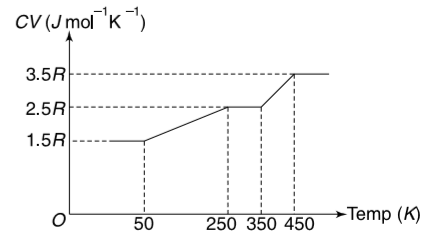The molar heat capacity of a gas at constant volumes is CV. If n moles of the gas under ΔT change in temperature it's internal energy will change by nCVΔT
only if the change of temperature occurs at constant volume
only if the change of temperature occurs at constant pressure
in any process which is not adiabatic
in any process
The correct Answer is:D
Step by step video, text & image solution for The molar heat capacity of a gas at constant volumes is C_V. If n moles of the gas under DeltaT change in temperature it's internal energy will change by nC_VDeltaT by Physics experts to help you in doubts & scoring excellent marks in Class 11 exams.
Updated on:21/07/2023Topper's Solved these Questions
Similar Questions
The molar heat capacity for an ideal monatomic gas is 3R.If dQ is the heat supplied to the gas and dU is the change in its internal energy then for the process the ratio of work done by the gas and heat supplied is equal to
View SolutionThe molar specific heat capacity at constant volume (CV) for an ideal gas changes with temperature as shown in the graph. Find the amount of heat supplied at constant pressure in raising the temperature of one mole of the gas from 200 K to 400 K.

View Solution
Knowledge Check
The molar heat capacity for a gas at constant T and P is
A3/2 RB5/2 RCdepends on atomicity of gasDinfinity (∞)For an ideal gas,
(i) the change in internal energy in a constant pressure process from temperature T1 to T2 is equal to nCV(T2−T1), where CV is the molar heat capacity at constant volume and n is the number of moles of the gas
(ii) The change in internal enregy of the gas and the work done by the gas are equal in magnitude in an adiabatic process.
(iii) The internal energy does not change in an isothermal process. ltbr> (iv) no heat is added or removed in an adiabatic processA(i),(iii)B(ii),(iii)C(iii),(iv)DallMolar heat capacity of gas whose molar heat capacity at constant volume is CV, for process P=2e2Vis :
ACV+R1+2VBCV+R2VCCV+RVDNone of these
A given sample of an ideal gas (γ=1.5) is compressed adiabatically from a volume of 150cm3 to 50cm3. The initial pressure and the initial temperature are 150kpa and 300K. Find (a) the number of moles of the gas in the sample, (b) the molar heat capacity at constant volume, (c) the final pressure and temperature, (d) the work done by the gas in the process and (e) the change in internal energy of the gas .
View SolutionThe molar specific heat of a gas at constant volume is 24 J/mol K. then change in its internal energy if one mole of such gas is heated at constant from 10∘C to 30∘C is
View SolutionCp is always greater than Cv for a gas, which of the following statements provide, partly or wholly, the reason for this?
(i) No work is done by a gas at constant volume
(ii) When a gas absorbs heat at constant pressure, its volume must change
(iii) For the same change in temperature, the internal energy of a gas changes by a smaller amount at constant volume that at constant pressure
(iv) The internal energy of an ideal gas is a function only of its temperature
View SolutionMolar specific heat at constant volume Cv for a monatomic gas is
View SolutionAn ideal gas undergoes an isobaric process. If its heat capacity is C, at constant volume and number of mole n, then the ratio of work done by gas to heat given to gas when temperature of gas changes by ΔT is :
View Solution
